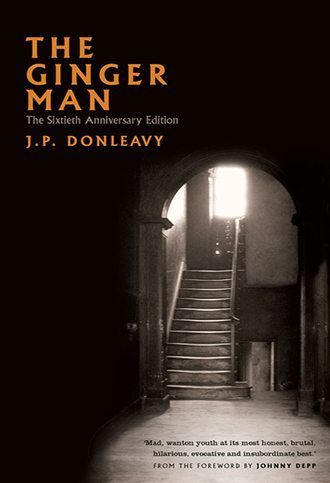
The Ginger Man
The Sixtieth Anniversary Edition
By: J.P. Donleavy
Publication Date: 15th July 2015
€75.00
The Ginger Man Sixtieth Anniversary Edition with foreword by Johnny Depp
As Brendan Behan edited – without permission – the manuscript that would become The Ginger Man, he predicted that it was destined to ‘go around the world, and beat the bejaysus out of the Bible’. Behan got the first part right. Since its first publication in 1955, more than 40 million copies of the novel have been sold and it has brought more (mostly American) tourists to Dublin’s Trinity College (where it was set) than the Book of Kells. To celebrate its sixtieth year of publication, as its author approaches his ninetieth, The Lilliput Press marks the occasion with a new, beautifully enanced hardback edition.
The Ginger Man is simply one of the great comic novels of post-war Europe – an anarchic, light-hearted, rambunctious twentieth-century classic following the social and sexual peregrinations of a footloose American student on the streets and in the pubs of Dublin. Dorothy Parker wrote of it, ‘stunning . . . brilliant . . . The Ginger Man is the picaresque novel to stop them all. Lusty, violent, wildly funny, it is a rigadoon of rascality, a bawled-out comic song of sex’.
As well as the original text it has a foreword by the actor and director Johnny Depp, who plans to produce a film version; an introduction by novelist Sean O’Reilly; an exchange of letters between Donleavy and the late Arland Ussher; a selection of archival photographs from Dublin and TCD in the early 1950s, and features pages from the original manuscript. This edition will also include an illustrated essay on ‘The publishing odyssey of The Ginger Man’ by bibliographer and archivist Bill Dunn. This details the book’s fraught origins, battles against censorship and multiple foreign translations from Korea to China, Finland and farther afield. The book, banned in Ireland until 1968, was published in the Irish Independent’s Great Irish Writers Series and has been cited as one of the 100 best novels of the twentieth century.
‘The strength of The Ginger Man rests in Donleavy not having created a tormented artist. Instead he is telling the story, in admittedly graphic detail, of the messy way that one man’s life staggers along.’ – The Irish Times
ABOUT THE AUTHOR
J.P. ‘Mike’ Donleavy (1926–2017) wrote more than twenty books after The Ginger Man, including The Beastly Beatitudes of Balthazar B (1968), A Fairy Tale of New York (1973), The Onion Eaters (1971) and Schultz (1979) (all available as eBooks from Lilliput), along with several works of non-fiction such as The Unexpurgated Code: A Complete Manual of Survival and Manners (1975). He lived along the shores of Lough Owel near Mullingar in County Westmeath.
Out of stock
| ISBN | 9781843516422 |
|---|
| Weight | 1 kg |
|---|---|
| Dimensions | 135 × 215 mm |
| Publication Date | 15th July 2015 |
| Format | Hardback with illustrations, 400pp |

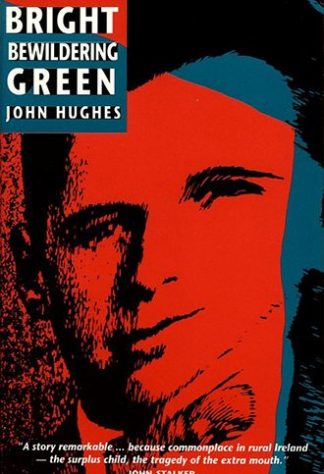
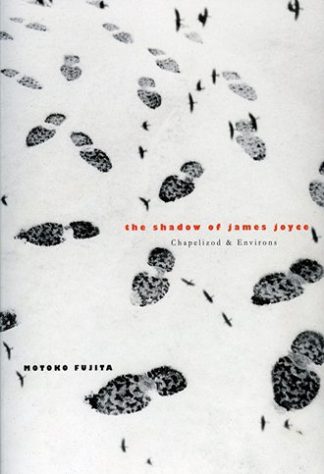
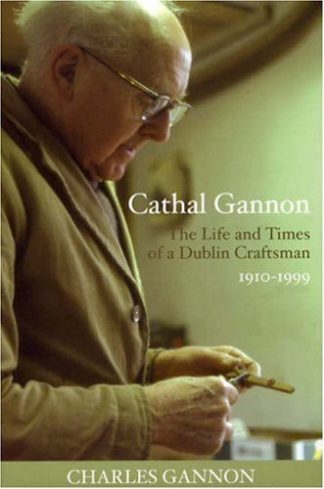
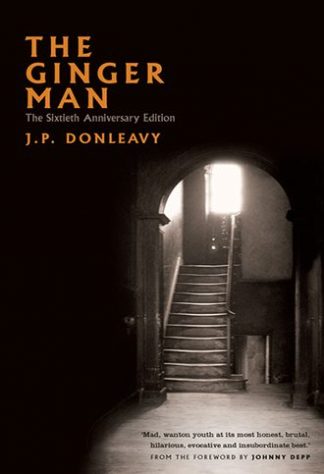
Lilliput Press –
“J.P Donleavy did a great job in writing a novel in the modernist fashion. He not only captured the ideals of a modernist in rejecting the norms of society, but he also did it using humor. Although the humor could be very vulgar and distasteful, it was used in a way to get across the personality of Sebastian and his rebellion to society and their “way of living”. (I did however find myself giggling at the circumstances he found himself in.)
Donleavy followed in the footsteps of James Joyce and attempted to use “stream of consciousness” in his novel “The Gingerman”. This new, modernist form of writing showed the real thoughts of a person and how these thoughts bring about other thoughts in succession. I found that he did a VERY good job in using this method, and although Dangerfield was not a character of high moral, he was an interesting character and the type of character that a modernist uses in order to get his point across. Yes, Dangerfield DID spend his time being cruel to women, breaking promises, and acting like a childish alcoholic; however, this character was shocking and had REAL thoughts and was the PERFECT character to portray a modernist view.
This book was also very interesting in the fact that this was how J.P. Donleavy really lived his own life and he was much like the character, making this novel a fictional autobiographical peice.
I guess the point I am trying to get across is that I have a lot of respect for this novel despite the actions of the character. I have studied this novel in a modernism class and the ideals of a modernist are VERY interesting once you get to know them. I think that if “A reader from Dublin, Ireland” were to study the views of a modernist writer, she would have found this book to be a lot more interesting. I enjoyed it, and I would recommend this book.” TANYA WEST
Lilliput Press –
“This is one of the greatest books I think I’ve ever read. A well written, true to life, sometimes erotic and sometimes idiotic view of a great character – his trials and tribulations. Recommended for anyone feeling a little low. This will bring a smile to your face.” ANDREW HORNER
Lilliput Press –
“”Singular” can mean remarkable, strange, referring to just one thing or having a zero determinant, whatever that is. In using this word in the title of this extravagant book, JP Dunleavy could easily have been writing his own review. For The Singular Man is indeed a great and peculiar book that manages to seem lucid or incomprehensible depending on your mood and level of attention. If it is about one thing it’s probably sex or maybe death or maybe the baser elements of maculinity. Or maybe I don’t know. The prose is extraordinary. The humour like Withnail and I after a near fatal cocktail of mind enhancing drugs. What really makes the novel live is the absurdist dialogue and the characterisation. The characters seem to emerge from the maelstrom of the prose as curiously compelling, complete and convincing eccentrics. There isn’t much of a plot in truth and it’s almost certainly not Dunleavy’s best work. It’s also remarkably similar to some of his other books in many respects making it feel a bit like a practice run. Yet reading it is such an extraordinary experience that you can easily forgive it’s many flaws. If you’ve not read a Dunleavy book before, I’d start with The Beastly Beatitudes of Balthazar B and save this up for when you really need another fix of madness and mayhem.” L MCCORMACK
Lilliput Press –
“I became aware of this book after recently reading a Hunter S. Thompson biography, wherein it describes how Hunter discovered the book in New York, and did his best to imitate Dangerfield’s lifestyle. After reading the Ginger Man it became apparent that Hunter had at last found a hard act to follow in terms of womanising, alcohol abuse and empty promises.
Apparently the Ginger Man was turned down by something like 40 publishers before finding it’s way to the mainly pornographic publishers Olympia Press in Paris. Despite turning out mostly smut, Olympia owner Maurice Girodias also published some early works by the likes of Samuel Beckett, William Burroughs, Henry Miller and Jean Genet amongst other rising literary talents of the time.
I mention the publication as it’s interesting to note that Donleavy entered into 20 plus years of litigation with the publishing house. He eventually won the case and subsequently owns Olympia Press.
But anyway, the book. It is, for better or worse, very real. The “hero” Sebastian Dangerfield is a reluctant family man and a reluctant student of law. He just doesn’t care about the things which we assume he should care about. He is constantly in a state of scheming his way into the next free drink, or getting into the knickers of an easily led girl. He has no morals, nor does he feel that he should have. He is banking on an inherited wealth which will be his once his sick father dies.
The style of the book is modern for the time of it’s writing. Donleavy uses both the first person narrative and the third person narrative to illustrate his main character. This can be confusing at first, but I found that after a few chapters, it adds to the urgency/pace (first person) and the backgrounds (third person) as he switches between the two different types of narration. This could not be achieved by sticking to either one of the disciplines.
The plot is quite simple, as a character novel should be. The backdrop is Dublin and then later London. Both are described well.
The dialogue is at times simply brilliant. One of the few books where you find yourself laughing aloud, and re-reading passages in an attempt to recall lines and slip them into a conversation at some point in the future. It is so easy to see why this book has since been turned into a stage production. I would imagine that the theater would be in fits of giggles.
I would recommend this book to anyone who is interested in the development of modern literature. And for that matter anyone with an open mind and a good sense of humour. It is in many ways one of the best novels of the 20th century.” J NEWMAN
Lilliput Press –
“Sebastian Dangerfield is in no way purported to be a model human being. Donleavy puts all of Sebastian’s flaws out in the open: Sebastian is a vulgar, abusive, and irresponsible alcoholic. Sebastian is in no way the gallant, classic, and Victorian hero of the past. He is instead the rejection of all that was pure and virginal in previous works of literature. He is the product of Modernism.
Modernism as part of its very foundation sought to shock people. I think of Sebastian Dangerfield as a literary equivalent of the shock-rocker Marilyn Manson. Will reading how Sebastian hits his wife make readers hit their spouse? Will listening to Marilyn Manson turn people into gothic murderers? Everyone has their own opinion as answer to those questions but it seems obvious to me that readers (and music listeners) need to realize that human beings are not the sugar coated ladies and gentlemen of yore. People do some terrible things. Everyone has a dark side, no matter how slight. I was not at all offended by The Ginger Man. Perhaps it was the fact that I was introduced to the text in the anything-goes Modernist context, perhaps I am a little too liberal. I will always find this book uproariously funny though. I can always side with a character that can make commentary on the human condition without doting clichés. I can at once laugh at Sebastian and be amused by him, without being “on his side” – his very dark side.” RS
Lilliput Press –
“What struck me most about this novel is how well it has aged, hardly seeming dated at all and remaining easy to read, which can not be said for other novels written at the same time.
Dangerfield, the central character in The Ginger Man, is a drunk, a liar and an adultery – but still such a wonderful character you can’t help but admire his sheer nerve and hope that he finds a way out of the downward spiral that the narrative describes.
Dangerfield and indeed the tone of novel, reminded me a lot of the film Withnail & I, which also portrays people in extreme poverty with a mixture of pathos and comedy and I would therefore recommend The Ginger Man to anyone who liked that film.” JUSTINE HARVEY
Lilliput Press –
“This book breaks every rule in the book. Treating grammer and convention with superb disregard, the frantic narrative keeps you continually ‘on your toes’. At the beginning I thought I liked the main character, only to witness him punching his wife and threatening his child a few chapters later. The mistake people make with this book is that they assume Dangerfield is presented as hero and therefore get offended. He is almost an anti-hero. The book doesn’t glorify his actions and neither does it condemn them. It simply isn’t a consideration on morals. The book is at once sad, optimistic, violent and serene. Most of all though, it is entirely memorable. Go in with an open mind and you will realise why it has been so consistently praised.”
Lilliput Press –
“Irish American author J P Donleavy’s 1955 debut novel The Ginger Man is a brilliantly witty (and, at times, surprisingly poetic) tale of drunken debauchery, introducing us to one of Donleavy’s most famous literary creations, Sebastian Balfe Dangerfield. As with other Donleavy novels, featuring similarly raucous characters such as Balthazar B and Darcy Dancer, The Ginger Man features Donleavy’s trademark prose style comprising short, astute sentences, razor sharp dialogue and the odd moments of poetic whimsy.
Donleavy’s protagonist Dangerfield is a married (though soon to be estranged) American student, father to a young daughter, studying in the leafy surrounds of Dublin’s fair city, scrimping to get by as he ponders his future destiny – key to which is his expectation of an inheritance from his (emotionally and physically) distant father. Dangerfield’s existence is essentially a mix of bluffing his position in society (together with his non-existent wealth) by means of avoiding his pursuing landlord and securing credit for his habitual drinking, and a series of sexual encounters with (unsuspecting) women, including laundress Christine, co-boarder (the initially reluctant) Miss Lilly Frost and the parentally abused housekeeper Mary.
Whilst any initial shock impact of Donleavy’s explicit writing has dated somewhat, and of course been exceeded by many more recent literary efforts, The Ginger Man still stands up as a highly amusing tale, written in a relatively original style and thereby retaining its position as my favourite Donleavy novel.” KEITH M
Lilliput Press –
“Sebastian Dangerfield is an appalling person but his rollick through Dublin and, later, London is compelling and funny. There’s a visceral sense of the poverty of the era and a savage eye cast on the Catholic mores of the time. The anti-hero’s own lustful quests are frank and frequent. He’s hard to like but somehow you end up rolling with him. The prose is Joycean, odd, great.” CAITLIN G
Lilliput Press –
“The Ginger Man describes the life of American student Sebastian Dangerfield at Trinity College, Dublin in the late 1940s. The story careers along, swinging between beauty, squalor, joy, misery, hilarity and sadness, often in the space of the same paragraph. Dangerfield seems at times a violent lunatic, while on other occasions presenting himself as an innocent, cast into the violent lunacy of Irish life. Ireland and the United States banned the book for obscenity, when often it is the appalling moral rigour of Irish society – intimidating the lovely Miss Frost for example – that really seems obscene.
There are no demarcations in this book. Dangerfield heads down to the area of Dublin near the sea. We are wondering at this point if he is swindling a woman he seduced, or preparing to keep his word and take this woman away from her evil father. As he goes about his ambivalent doings, Dangerfield thinks of creatures that inhabit the rock pools of this seashore, cut off from the ocean in what he calls their “crystal cradles”.
There’s no danger of living in a rock pool when you read The Ginger Man. The ocean rolls in, sweeps over little ponds and takes you away.
You could say Dangerfield is a loveable rogue, but you’d be wrong. He won’t stay in any rock pool for loveable rogues. Dangerfield is a monster. He is lovable. It is remarkable that Donleavy got those two things to exist so powerfully together. I suppose, as Booth Tarkerton said in relation to one of his own loveable rogues, there is more rejoicing in heaven over one sinner repented than over all the saints who consistently remain holy.
Technically the writing also avoids rock pools, switching between first and third person. You read about Dangerfield in the third person, only for him to pop up in the first person, ready to cause trouble, throw pot plants through the windows of banks, abuse or charm women.
I was going to say this book isn’t for the faint hearted, but part of me thinks that if I was faint of heart – hiding in my own narrow pool like Miss Frost – this book might help me.” MARTIN JONES
Lilliput Press –
“J P Donleavy wrote a large number of marvellous books, but The Ginger Man was a sensation when it was first published. A raunchy and very funny look at life, love and the pursuit of happiness!
The Onion Eaters, another of Doleavy’s works is my personal favourite work, but all his large output will enlighten and amuse you!!” V.C FREEDMAN
Lilliput Press –
“JP Donleavy at his best – funny, pathos, frustrating – I enjoyed it. Not as funny as Balthazar B but infinitely believable.”